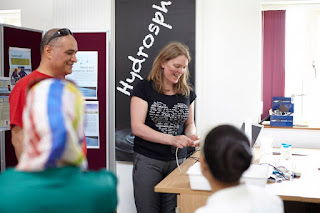Failing to succeed: A look at the role of failure in student learning
The value of constructive feedback is well understood and is an integral part of the postgraduate taught experience..at least it is during the taught component. So what happens during the project? Students working independently have fewer opportunities to seek out feedback during the process and are expected to work more independently. This can feel pretty unsettling. Confidence is tested to the max. I think this is good preparation for the real work environment, wherever that may be.
The dangers of over-supporting students
Its important for students to realise that failure is not the end of the world and it can make us stronger, more experienced and less likely to repeat past mistakes. As educators, we should be supporting confident learners by teaching them how to be resilient and to welcome feedback, good and ...not so good. We should be less afraid of letting students fall by making sure we are providing the right safety gear, crash mats and emotional support. As we approach the last big push of the dissertation write up and submission, our postgraduate taught students have switched from their structured learning with classmates, reading lists, diet of past exam papers to crunch through and defined learning paths to an independent research project. This is a big jump for some students doing something, maybe more out of their depth, with busy research staff in unfamiliar surroundings. Some students crave the structure and support of the classroom environment and morale can dip. It is now that students with the biggest fear of failure are at their most uncomfortable. The ability to adapt to the unexpected is a valuable skill. Resilience and creativity are what is needed if things go wrong.
 |
| What goes up....gets stuck on the roof |
Students worry about aspects of failure.
It makes me smile when students come and see me worried that their experiment or study "won't work". What they really mean is that it might not show anything. Students are often under the illusion that we (academics) plan our grand experiments, disappear into mysterious laboratories and emerge clutching Nobel Prize-winning revelations. This is not, unfortunately, for me at least, how research works. The answer to our research question and the result of our test may be that nothing changes or happens. This is a result too. Thomas Edison reportedly stated:
"I have not failed 700 times. I have not failed once. I have succeeded in proving that those 700 ways will not work. When I have eliminated the ways that will not work, I will find the way that will work.".
 |
| Demonstrating hydropower |
So, students have their experiment planned, ethics approval sorted and their supervisor has checked that everything is OK and then something unexpected happens. A piece of kit doesn't arrive on time, or breaks, or a collaborator pulls out or there is a power cut 11 weeks into a 12 week experiment or you forgot to hit "record" at the start of the interview. There are not many successful researchers out there who haven't felt the thump of realisation when something has gone very very wrong. It is how we react that is important. We learn from our mistakes. I recall the embarrassment when my rather startled supervisor who, after the blue flash and sudden bang, explained to me
"No Sharon, I said 'for God's sake, DON'T turn it on' ". I now always ensure, with any of my students, that I am the one operating the switch.

